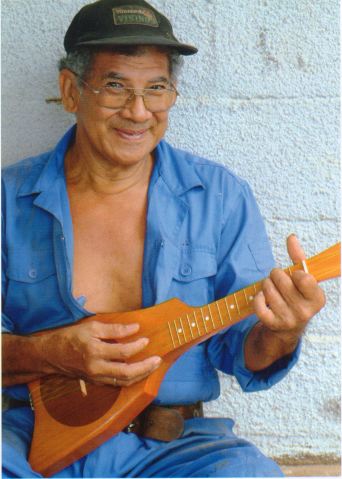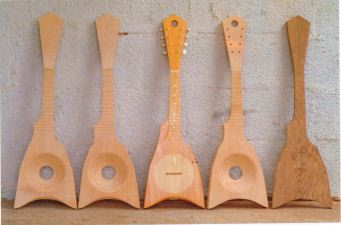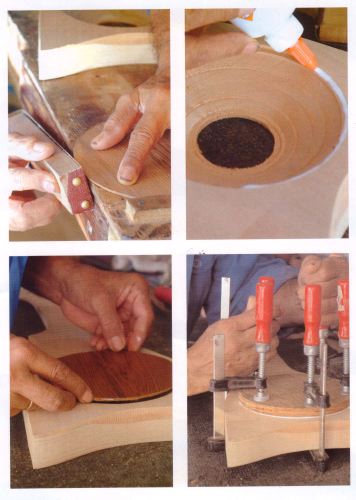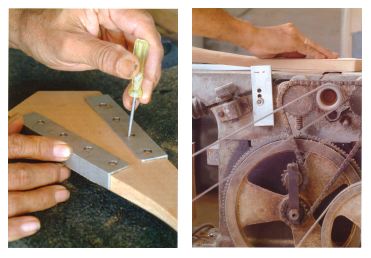

An integral part of the music in Tahiti & her islands, the ukulele is a magical instrument whose sounds are unequaled, just like its evocative powers. Ukulele is a name that sings each time one pronounces the word's three syllables--UKU-LE-LE. It's a word that opens one's imagination in the direction of enchanting islands, towards images from the past and kitsch old Hollywood movies.
It's an instrument that sometimes provokes a smile when one discovers it, then surprise when one listens to it being played. In Tahiti & Her Islands, there are some musicians who know how to draw out of this wooden assembly stunning tunes that can take an enthusiastic party known as a "bringue" into the wee hours of the morning. The ukulele can also play the schmaltzy love songs capable of emotionally arousing even the most seemingly hardened of men.
This simple but fascinating instrument is part of daily life in Tahiti & Her Islands. It can be found everywhere, at any moment during your visit. You may find the ukulele being played where family and friends wait for arriving passengers at the Tahiti FAA's International Airport. You may hear it when a young man tries to overcome his boredom by strumming the same chords in a tireless manner aboard a ferryboat traveling between Tahiti and her sister island of Moorea. Or you may hear the ukulele being played as it accompanies a singing family. But if you recall, you've already here the sounds of the ukulele, joined by the guitar and the famous "trash can base", among a typical local group of musicians as your plane began its landing approach.
There are many musicians in Tahiti & Her Islands who make their own ukulele, adapting the instrument to their ear, shaping it to their style of playing and their individual taste. Such ukuleles are perfect musical instruments, very unique and very attached to the instrumentalist. There are also ukuleles made individually, slowly, with real love for a job well done, just like the previous ones. But these instruments are destined to be exhibited, to be showed off because they posses a unique know-how. Finely worked, sculpted, painstakingly decorated, they are more often more bas-relief than a musical instrument. Each is a one-of-a-kind work of art.

Now there are the ukuleles that Maurice Chebret has been making for a little more than a year. A native of the Tuamotu atoll of Fakarava, Chebret was 14 when he made his first ukulele. At that young age, he would wait patiently during parties until the musicians set down their ukuleles for a few minutes so that he could quickly look them over and copy their instruments. Using materials at his disposal, he made his first ukulele out of coconut wood. Then professional and family obligations took Maurice away from his preferred instrument until his retirement. And a year ago this self-made stringed instrument maker created Uk's Reka and started up again his sander and wood lathe, took out his carpentry pencil and his double ruler and began making a new ukulele each day.
Maurice's ukuleles, like all ukuleles found in French Polynesia over the past century, are nothing special to look at with their faraway origin dating back to the Portuguese four-stringed guitar that was introduced into Hawaii in the 1870s. Today's ukulele in Hawaii is basically a small guitar derived from the Portuguese "machada". But the ukulele found in Tahiti & Her Islands today has only a faint resemblance to the Hawaiian version.

Maurice makes instruments best described as real instruments of Tahiti & Her Islands. These ukuleles have developed a demanding clientele in the United States, New Zealand, Hawaii and Tahiti. His instruments are also perfectly adapted to the tastes and expectations of local musicians. And it's just because these ukuleles are found at parties as well as musical concerts that they have become a sought after souvenir by visitors, who buy them and take them home to serve as decorations. Thus, it's a little bit of Maurice's know-how, or "savoir-faire", that leaves French Polynesia with each ukulele that ends up being hung on a wall of a living room in Marseille or resting on a bookshelf in a San Francisco office.
But Maurice, the Polynesian stringed-instrument maker, has plenty of savoirfaire. Benefiting from a real experience of working with wood, he created his own, rather elaborate machine that enables him, in only one movement of the ukulele's handle, to make all of the necessary keyboard tablatures for playing. He also has succeeded in adding efficiency to his fabrication, organizing each stage of work, all of which he does himself and by hand, in order to increase productivity and, therefore, meet orders from his various markets-curios and souvenir stores and, of course, musicians.
Several wood species are used and each offers the instrument a different tone, or, as Maurice likes to say, a different voice. Thus, a ukulele made from "Salu Salu" gives the instrument a child's voice. "Kauri" wood gives it a deeper voice, the voice of a man. Mahogany wood, Maurice's preference, gives the ukulele the real voice of a singer. As for the wood located next to the strings, that which protects the heart of the ukulele, Maurice chooses red cedar, a wood hp prefers to "uru", or the breadfruit tree, which breaks too much. But wood is not the only determining factor in the musical quality of one of Maurice's ukuleles. The amount of varnish can also change the instrument's tonality, without changing anything in the four double strings--generally sol, do, mi, Ia.

But Maurice's real trademark is the way he hollows out the ukulele, creating the instrument's resonance chamber. This is where all of the artisan's savoir-faire comes into play as he hollows out a smooth, rounded outline, offering musicians the possibility of playing fast, stringing notes together very rapidly without losing each individual note. Truly a workmanship adapted to local playing.

So if you also want to participate in the ukulele's "revival", as is occurring at the Ukulele Club de Paris, Ukulele Afternoon in Tokyo or Radiohead, allow yourself to be seduced by this out of the ordinary instrument, capable of bringing you back to our islands the very moment you hear its first note being played.
Back to Tahiti Ukulele.